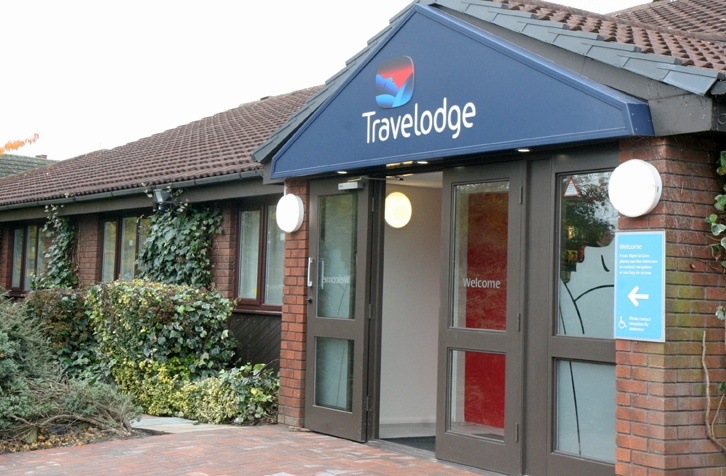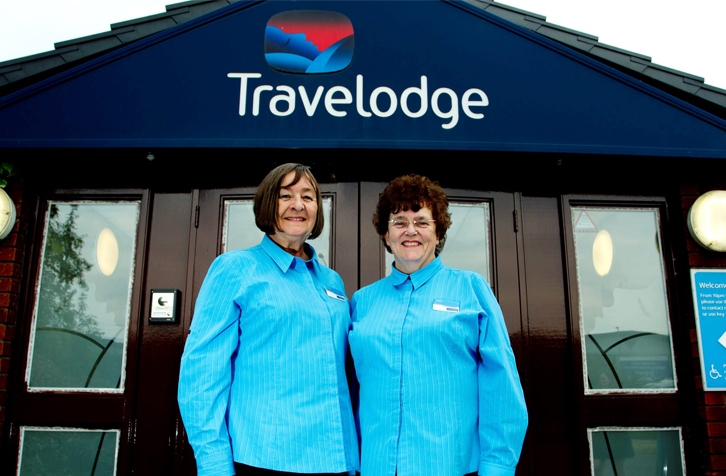THAME, England—With almost 550 hotels, mostly in the United Kingdom, Travelodge Hotels Limited—or Travelodge U.K.—is as much a fixture of British life as are red pillar boxes, telephone boxes and Routemaster double-decker buses.
Travelodge, along with Whitbread PLC’s Premier Inn brand, caters to a mostly domestic clientele that, demographically speaking, would not have considered a hotel stay 30 or even 15 years ago. Most rooms are booked directly online.
Peter Gowers, who became Travelodge’s CEO in 2013, said the company is the truly iconic brand in the U.K., one that makes travel affordable and easy. He added his mission is to continue to make Travelodge represent the best value in the hotel industry.
In 2017, Travelodge plans to open 15 hotels in the U.K. to bring its total portfolio to 558 properties, all to be developed by third-party investment to a combined tune of £125 million ($159.8 million).
Gowers said the brand has identified an additional 250 sites in the U.K., with a focus on new business hubs, tech-startup destinations and the corridor around the M25 freeway, which stretches 117 miles around London.
Outside of the U.K., Travelodge’s portfolio also contains 12 hotels in Ireland and five in Spain.
American DNA, British icon
Travelodge U.K. was born when Lord Forte and his Trusthouse Forte group brought the U.S. Travelodge brand in the mid-1980s and introduced the chain to the U.K., with properties usually beside roadside Little Chef fast-food restaurants. Today, the U.K. and U.S. companies operate separately.
Travelodge’s first hotel in the U.K. was the 20-room Travelodge Burton A38 (Northbound), which opened in 1985 near Barton-under-Needwood, Staffordshire, and is still open for business.
Shakila Ahmed, Travelodge’s director of communications, said, “Nostalgia-wise, it is good to say we still have it. It’s been refurbished, and now it has a sister hotel on the opposite side of the dual carriageway.”

Travelodge U.K.’s first property, the Travelodge Burton A39 (Northbound), opened in 1985 in Barton-under-Needwood in the county of Staffordshire. (Photo: Travelodge (U.K.))
Since its genesis in 1985, the Travelodge brand has been owned by several entities, notably Granada, Dubai International Capital and private equity firm Permira under an ownership arm TLLC Group Holdings. Despite acquisition rumors over the last three or so years, Travelodge remains independent, and the largest independent chain in the U.K.
In August 2014, the company sold its 144-asset Grove Portfolio to Avenue Capital Group, GoldenTree Asset Management and Goldman Sachs for approximately £500 million ($639 million). The portfolio was considered to the last large debt-acquisition portfolio stemming from the financial crisis in the U.K.
An owner’s view
Publicly owned Prestbury Investments owns 55 Travelodge assets within its Secure Income Real Estate Investment Trust arm, including both of the Barton-under-Needwood hotels, according to Tim Evans, partner and property director at the company.
Evans said a huge attraction is Travelodge’s highly liquid, individual lot sizes, with 44 of his assets having a value of less than £5 million ($6.4 million).
“Smaller lot sizes are particularly attractive to the private investor market. … (But our) biggest three assets account for approximately 26% of our portfolio, in the strong locations of Oxford, Manchester and Edinburgh,” he said.
Evans said the Travelodge story has been an excellent one since its turnaround via a company voluntary arrangement, or CVA, in 2012. Since then, he added, every hotel and room in the Secure Income REIT portfolio has been refurbished and refitted.
Being Travelodge’s largest owners, Secure Income REIT and Prestbury were heavily involved in Travelodge’s restructuring at that time.
“We therefore gained an excellent understanding of the recovery plan post-CapEx,” Evans said. “(Earnings before interest, tax, depreciation and amortization) is growing, and rents are set at sustainable levels.”
Prestbury, in its capacity as an investment adviser to Secure Income REIT, obtained a historic knowledge of Travelodge’s portfolio and operations through prior ownership of properties, within a larger portfolio from 2004 to 2014 and via a private joint venture partly owned by a business associated with Prestbury, Evans said.
Such a relationship with Travelodge executives was and has been key to Secure Income REIT’s continued partnership and success of its current Travelodge portfolio.
“The portfolio offered SIR long-term, inflation-linked income, the weighted average unexpired term was 27 years on acquisition, and the initial income was £13.7 million ($17.5 million) per annum with further potential to grow earnings through uncapped, upward-only retail priced index-linked rent reviews,” Evans said. “It is an attractive return profile, with the initial yield of 7% expected to increase to 7.3% after October 2017 rent reviews.”
He added that estimated geared returns of 13.5% per year should drive an expected total shareholder return over the next six years of approximately 11% per annum.
The attraction of Travelodge might also derive from a far simpler source, Evans said.
“The well-known Travelodge brand is recognized and easily understood both by customers and investors,” Evans said.
Historical soul
Under Gowers, Travelodge has undergone a transformation, Ahmed said, and investment has been overhauled, both in terms of its hotels and the company itself.
“Investment in the product was critical,” Ahmed said. “If you have a good product to sell, you have more confidence. Before we had a mixed bunch of real estate, and standards depended on which hotel you stayed at.”
Ahmed said more than half of Travelodge’s business today comes from Financial Times Stock Exchange top 100 firms, while its biggest business customer is the U.K. government.
Another sea change for Travelodge is the company now works closely with U.K. government entity Job Centre Plus, which helps entry-level people enter management. Travelodge’s focus on career development for its employees has been a part of its identity since its launch in the U.K., Ahmed said.
Joan Cable applied for the hotel receptionist position at Travelodge’s first property, as did close friend Judy Harper, and both are still actively working. Together they have almost 65 years of on-site experience.
“I remember watching the hotel being built,” Harper said, who added she previously worked at the adjacent Little Chef restaurant and has checked in more than 150,000 guests to the property.
“I had to walk across the car park to the Little Chef to process customer payments,” Harper said of those early days.

Judy Harper (left) and Joan Cable are the only receptionists and duty manager the Travelodge Burton A39 (Northbound) have ever had since it opened in 1985, and together their combined experience totals almost 65 years. (Photo: Travelodge (U.K.))
Cable said one very enjoyable aspect is seeing returning customers.
“I have customers from all over the world that still send me Christmas and birthday cards every year,” she said. “One lady even sends me flowers, and that’s such a lovely gesture.”
Harper said she has met the third generations of some families who have checked in to the hotel.